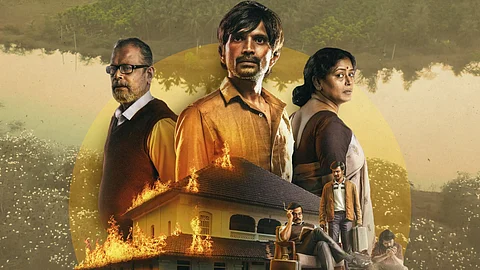
- Reviews
- Power List 2024
- Cannes 2024
- In-Depth Stories
- Web Stories
- News
- FC Lists
- Interviews
- Features
- FC SpecialsFC Specials

Director: Ajay Nag
Cast: Mohan Bhagat, Supritha Sathyanarayan, Bhooshan, Ravindra Vijay, Laxman Meesala, Boddepalli Abhishek, Surabhi Prabhavathi
Available in: Theatres
Duration: 134 minutes
The concept of time has often been the subject of fascination for filmmakers across time and languages. If it isn’t your literal and highly technical time-travel films such as Interstellar and The Back To The Future trilogy, it’s maybe a meditation on the concept with films like Past Lives, and closer home, Three of Us. Like those who came before him, debutant director Ajay Nag is irrevocably obsessed with the relativity of time in his latest Telugu movie Aarambham, a film that is surprisingly moving when it falls in the second category of such cinema.
Aarambham, based on Anush A Shetty’s Kannada language novel ‘Neenu Ninnolage Khaidi’, often sees its lead actor Miguel (Mohan Bhagath) contend with existential questions about time. “If the sun sets and rises again in due time, why can’t time come back to me like the sun?” he asks. It’s important here to note that Miguel is also known as Prisoner 299, and does all his ruminations inside a dowdy cell. When he eventually escapes his cell in a textbook locked-room mystery scenario, a night before his death sentence, he leaves the investigators scratching their heads — along with a chunky leather diary of his for company. Even the prisoners in this jail have their own take on the wretched nature of time. “If his time is bad, they’ll catch him, if his time is right he will not be calm, and get caught,” a man says, with a twinge of envy. Aarambham is often at the risk of sounding extremely heavy-handed, as things usually go with films that grapple with empirical questions.
And that’s quite a difficult position to be in, especially when we’re talking about a time-travel drama, which requires plenty of technical finesse. The lack of resources is visible especially in its “science experiment” portions, where Miguel and his mentor try to create a portal to warp time and relive moments in the past. A sensory deprivation tank like device is unfortunately not enough to make us buy into its world. But even if you keep the gimmicks away for a minute, and wonder why these men are off to bend time, Aarambham still doesn’t have an answer for us. A young boy dropping dead due is promptly ignored, and a woman conveniently swallows the grief of losing her brother, all so that she can be part of the same experiment that took his life.
Films about time are almost always interconnected with stories of love. We all enjoy the staggering ambition of a film like Interstellar, but for a lot of us, the film is equally about a father’s love transcending through time to reach out to his daughter. What Aarambham lacks in technical know-how, it tries to make up for it with its emotional core — which is Miguel’s relationship with his mother. Surabhi Prabhavathi is terrific as the forgetful mother who wants to make memories with her son. Leela isn’t your typically devoted mother — she casually rues the day she had to adopt Miguel, anytime he ignores a chore, and sometimes teaches him the trick to being happy with just a biryani and a soda. The time-travel shtick feels less and less like one, everytime the film lets us in on such moments. Aarambham is a better film whenever “love” transcends “time”.